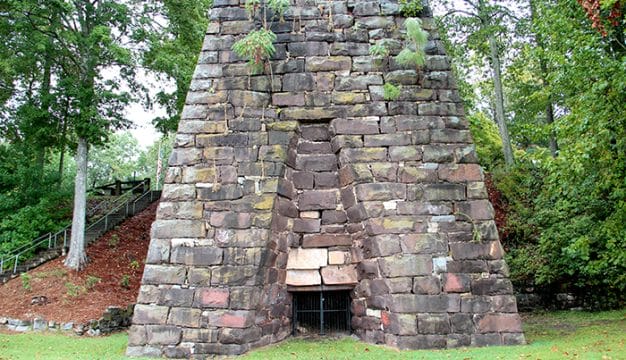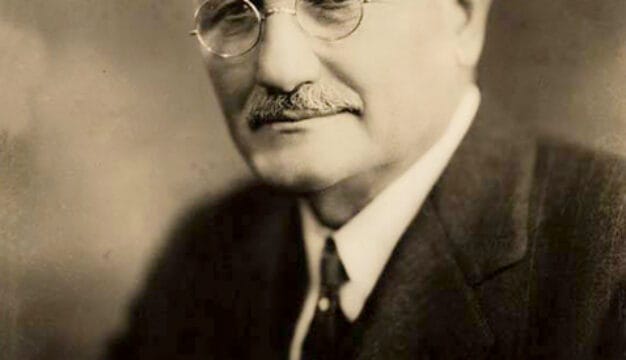Henry DeLamar Clayton Sr.
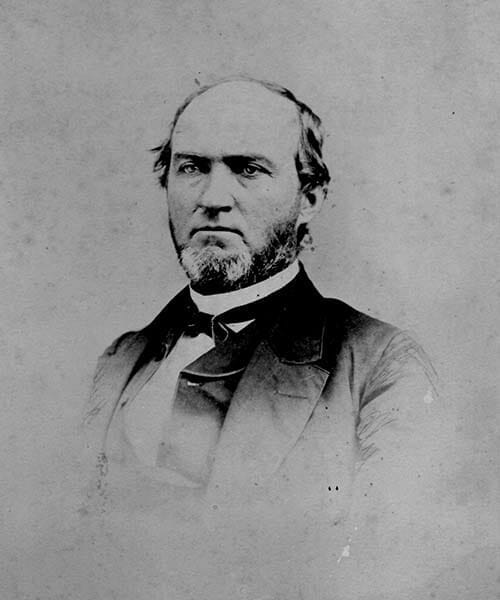 Henry Delamar Clayton Sr.
Henry DeLamar Clayton Sr. (1827-1889) was an Alabama attorney, state legislator, and Confederate Army officer. He helped organize and train the First Alabama Infantry and the Thirty-ninth Alabama and commanded these and several other Alabama regiments. He rose to brigade command and then to the rank of major general and divisional command in the Army of Tennessee. After the war, he practiced law and operated a plantation. He also served as post-war circuit court judge and was president of the University of Alabama.
Henry Delamar Clayton Sr.
Henry DeLamar Clayton Sr. (1827-1889) was an Alabama attorney, state legislator, and Confederate Army officer. He helped organize and train the First Alabama Infantry and the Thirty-ninth Alabama and commanded these and several other Alabama regiments. He rose to brigade command and then to the rank of major general and divisional command in the Army of Tennessee. After the war, he practiced law and operated a plantation. He also served as post-war circuit court judge and was president of the University of Alabama.
Clayton was born on March 7, 1827, in Pulaski County, Georgia, to Nelson and Sarah Leith Caruthers Clayton; he was one of six siblings and the family moved to Alabama when he was a boy. He graduated from Emory and Henry College in Emory, Virginia, in 1848. He returned to Alabama and read law in Eufaula, Barbour County, before establishing his law practice in Clayton, Barbour County. In 1850, he married Victoria Hunter, with whom he had 13 children. Active in local politics, voters elected him to the Alabama House of Representatives in 1857, in which he served until 1861.
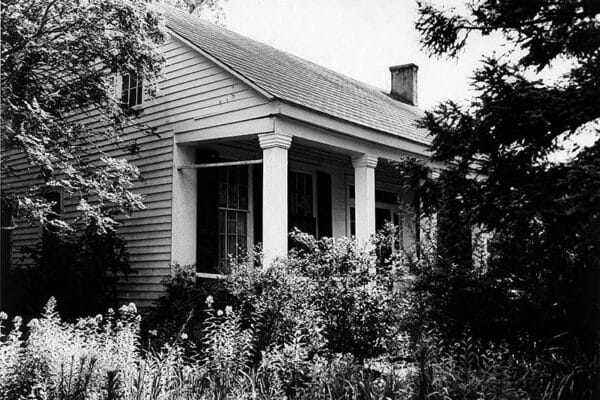 Henry D. Clayton House
Immediately prior to the Civil War, he helped organize a volunteer militia unit in the fall of 1860 and served as its colonel. After Alabama’s January 1861 secession and before the start of the war in April, Gov. Andrew B. Moore ordered Clayton to Pensacola, Florida, to organize Alabama volunteers assembling there to assist in the capture of federal installations. While there, the volunteers elected Clayton as colonel of the First Alabama Regiment despite his having only a few months of militia service. The regiment participated in the successful capture of Forts Barrancas and McRee and an unsuccessful attempt to take Fort Pickens. In the late winter of 1862, he returned to Opelika, Lee County, to help organize the Thirty-ninth Alabama, comprised of ten companies of approximately 100 men each. Barbour raised some of the recruits from Barbour County and helped to train them. His younger brother, Capt. Joseph C. Clayton, commanded Company H in his regiment. After the Confederate retreat at the April 1862 Battle of Shiloh in Tennessee, and the subsequent abandonment of Corinth, Mississippi, Clayton’s forces participated in the Confederate invasion of Kentucky in October 1862.
Henry D. Clayton House
Immediately prior to the Civil War, he helped organize a volunteer militia unit in the fall of 1860 and served as its colonel. After Alabama’s January 1861 secession and before the start of the war in April, Gov. Andrew B. Moore ordered Clayton to Pensacola, Florida, to organize Alabama volunteers assembling there to assist in the capture of federal installations. While there, the volunteers elected Clayton as colonel of the First Alabama Regiment despite his having only a few months of militia service. The regiment participated in the successful capture of Forts Barrancas and McRee and an unsuccessful attempt to take Fort Pickens. In the late winter of 1862, he returned to Opelika, Lee County, to help organize the Thirty-ninth Alabama, comprised of ten companies of approximately 100 men each. Barbour raised some of the recruits from Barbour County and helped to train them. His younger brother, Capt. Joseph C. Clayton, commanded Company H in his regiment. After the Confederate retreat at the April 1862 Battle of Shiloh in Tennessee, and the subsequent abandonment of Corinth, Mississippi, Clayton’s forces participated in the Confederate invasion of Kentucky in October 1862.
In December, Clayton gained his first combat experience when he led the Thirty-ninth in the fierce Battle of Stones River just outside of Murfreesboro, Tennessee. Fed piecemeal into an attack on Gen, Philip Sheridan’s division of the Army of the Cumberland, Clayton’s regiment suffered heavy casualties. Badly wounded himself, Clayton found out afterward that among those mortally wounded was his younger brother, Joseph. In April 1863, Clayton was promoted to brigadier general and assumed command of three other Alabama regiments, the Eighteenth, the Thirty-sixth, and the Thirty-eighth, in the division of Maj. Gen. Alexander P. Stewart.
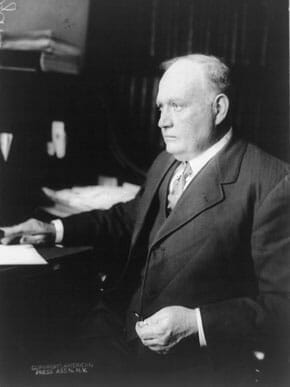 Henry D. Clayton Jr.
Lightly engaged during the Army of Tennessee’s retreat from southeastern Tennessee in the Tullahoma-Chattanooga Campaign, Clayton grew accustomed to brigade command. Clayton and his new command found themselves in the thick of fighting during the Confederate victory at the Battle of Chickamauga, September 19-20, 1863. On the first day of fighting, Clayton and his men engaged in vicious combat in the mid-afternoon. Later that afternoon, the brigade broke the center of the Union line in Brotherton Field. Hampered by a lack of reinforcements and disorganization in his division on the first day, Stewart and his two brigade commanders, Clayton and William Bate, were able to press their advantage on the next day when the Union line broke. Clayton’s brigade captured a large portion of a Wisconsin regiment as the Confederates forced the Union Army of the Cumberland back to Chattanooga. Once again in the thick of the fighting at Chickamauga, Clayton suffered another wound that kept him from action in November at Chattanooga.
Henry D. Clayton Jr.
Lightly engaged during the Army of Tennessee’s retreat from southeastern Tennessee in the Tullahoma-Chattanooga Campaign, Clayton grew accustomed to brigade command. Clayton and his new command found themselves in the thick of fighting during the Confederate victory at the Battle of Chickamauga, September 19-20, 1863. On the first day of fighting, Clayton and his men engaged in vicious combat in the mid-afternoon. Later that afternoon, the brigade broke the center of the Union line in Brotherton Field. Hampered by a lack of reinforcements and disorganization in his division on the first day, Stewart and his two brigade commanders, Clayton and William Bate, were able to press their advantage on the next day when the Union line broke. Clayton’s brigade captured a large portion of a Wisconsin regiment as the Confederates forced the Union Army of the Cumberland back to Chattanooga. Once again in the thick of the fighting at Chickamauga, Clayton suffered another wound that kept him from action in November at Chattanooga.
Clayton recovered from his wound and in the spring of 1864 resumed brigade leadership in opposing Maj. Gen. William Tecumseh Sherman’s efforts to capture Atlanta. After Sherman’s forces reached the area immediately north of Atlanta, Confederate president Jefferson Davis replaced Confederate commander Joseph E. Johnston with Gen. John Bell Hood. Clayton rose to command Stewart’s old division and led them in the vicious fighting around Atlanta in 1864, particularly in the Battle of Jonesborough. When Hood moved his greatly diminished Confederate army north to try and lure Sherman away from his invasion, Clayton and his division moved through north Alabama and into Tennessee. Arriving too late to participate in the disastrous frontal assaults at Franklin, Tennessee, Clayton and his division advanced to Nashville. After the Union Army shattered the remnants of Hood’s command outside of Nashville, Clayton and his men distinguished themselves as the Confederate rear guard, saving the army’s wagons and artillery in the retreat. Transferred to North Carolina as Sherman ploughed his way through the Carolinas in the spring of 1865, Clayton and his troops participated in the Battle of Bentonville and surrendered on April 26 at Durham Station, North Carolina, a few weeks after the Confederate surrender at Appomattox.
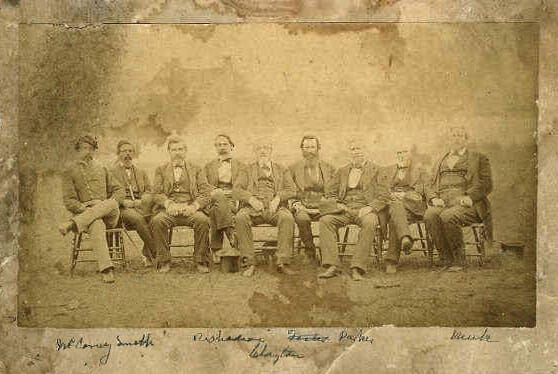 Henry Delamar Clayton Sr. and UA Faculty
Immediately after the war, voters elected Clayton as judge, but federal leaders of Congressional Reconstruction replaced him because of his earlier position as a high-ranking Confederate officer. Returning to overseeing his plantation outside of Eufaula and practicing law, Clayton opposed the violence of the Ku Klux Klan during Reconstruction. In 1880, he became a circuit court judge, serving until he resigned to run for governor in 1886. Defeated in his candidacy by Thomas Seay, that summer the trustees of the University of Alabama, Tuscaloosa, Tuscaloosa County, elected him professor of international law and president. He embraced New South reforms of higher education promoted by Alabama A&M College (present-day Auburn University) presidents Isaac Taylor Tichenor, David French Boyd, and William Leroy Broun during this era. These reforms included a deviation from the university’s traditional classical education that included added mechanical engineering, more rigorous and specialized scientific courses, and physical education to the curriculum, but unfortunately he served only three years and thus failed to implement all these reforms during his administration.
Henry Delamar Clayton Sr. and UA Faculty
Immediately after the war, voters elected Clayton as judge, but federal leaders of Congressional Reconstruction replaced him because of his earlier position as a high-ranking Confederate officer. Returning to overseeing his plantation outside of Eufaula and practicing law, Clayton opposed the violence of the Ku Klux Klan during Reconstruction. In 1880, he became a circuit court judge, serving until he resigned to run for governor in 1886. Defeated in his candidacy by Thomas Seay, that summer the trustees of the University of Alabama, Tuscaloosa, Tuscaloosa County, elected him professor of international law and president. He embraced New South reforms of higher education promoted by Alabama A&M College (present-day Auburn University) presidents Isaac Taylor Tichenor, David French Boyd, and William Leroy Broun during this era. These reforms included a deviation from the university’s traditional classical education that included added mechanical engineering, more rigorous and specialized scientific courses, and physical education to the curriculum, but unfortunately he served only three years and thus failed to implement all these reforms during his administration.
Clayton died on October 13, 1889, in Tuscaloosa. He was buried in Fairview Cemetery in Eufaula. Clayton’s son Henry Delamar Clayton Jr. was a federal district court judge and authored the noted Clayton Antitrust Act of 1914. Another son, Bertram Tracy Clayton represented New York in the U.S. House of Representatives for one term and was killed while serving in France during World War I.
Further Reading
- Castel, Albert. Decision in the West: The Atlanta Campaign of 1864. Lawrence, Kan.: University of Kansas Press, 1992.
- Cozzens, Peter. This Terrible Sound: The Battle of Chickamauga. Urbana and Chicago: University of Illinois Press, 1992.
- Warner, Ezra. Generals in Gray: Lives of the Confederate Commanders. Baton Rouge: Louisiana State University Press, 1959.
